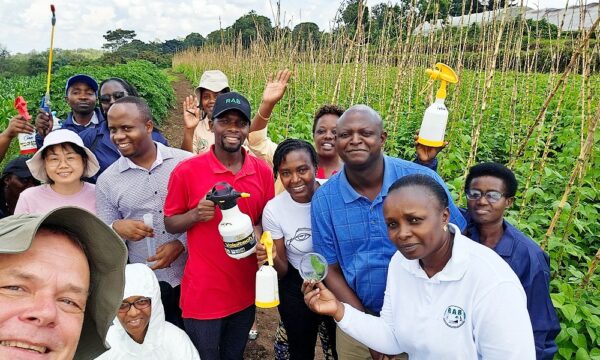
Spotted-Wing Drosophila, Drosophila suzukii
The soft-fruit pest Drosophila suzukii, or spotted-wing drosophila (SWD), is particularly difficult to control because of its short generation time and its very broad host range, including many wild and ornamental plants. The pest has been causing damage to fruit crop in Europe as well as North America where damages costing $500million were reported in the USA. The pest arrived in Europe from Asia in 2008, presumably in the larval stage of infested fruit. The fruit fly attacks by depositing its eggs in ripe and healthy fruit where the larvae quickly hatch destroying the fruit.
The occurrence of D. suzukii throughout the majority of the year in a wide variety of habitats requires the development of an area-wide management approach. One of the reasons this fruit fly has caused such extensive damage is because its range is not just limited to cultivated fields but it has also thrived in the natural environment which offers plenty of breeding opportunities such as wild berries, ivy and even mistletoe. Insecticides, mass trapping and sanitation measures have proven to be locally efficient but cannot be used on a large scale in non-crop habitats.

Spotted-wing Drosophila by Martin Cooper (via Wikimedia Commons)
As an alternative, classical biological control through the introduction of specific parasitic wasps (parasitoids) from the region of origin of the fly may represent the only long term solution for a sustainable area-wide control of the fly. Biological control specialists from Switzerland, France, China and Japan, started their search for parasitoids in China and Japan in 2015. Out of the eight parasitoids the team identified as viable possibilities, they found that the most frequent and abundant parasitoid was Ganaspis sp., a wasp attacking young larvae in fruits and killing pupae.
Several populations of this parasitoid and others were brought to quarantine laboratories in Switzerland and France for studies on their biology. In particular, the specificity of the parasitoid in laying eggs only in D. suzukii was carefully assessed to ensure there was no risk that the parasitoid would attack native flies in Europe.

Ganaspis sp. (by T.Haye)
So far, studies have shown that Ganaspis sp. is the most specific species, but differences exist between populations. Some populations only attack D. suzukii in fruits, refusing even the same host in artificial diets, whereas other populations are able to attack one or two other fly species. In the long-term, the goal is to release the insect in Europe to achieve a permanent control of the pest but further studies are needed to select the most suitable population for introduction and sort its taxonomic status.
This innovative research has been carried out by Pierre Girod as his PhD thesis at the University of Neuchâtel with supervision from Marc Kenis and Tim Haye at CABI in Delémont, Switzerland.
1 Comment
Leave a Reply
Related News & Blogs
Biological control in action: Zambia’s field days on fighting fall armyworm
Experts from CABI recently held two field days and an expo in Zambia, showcasing innovative approaches to pest management to 584 farmers, agro-dealers and other stakeholders to help raise awareness of approaches to tackle the invasive fall armyworm (Sp…
11 June 2025





[…] 6. Classical biological control of Drosophila suzukii with Asian parasitoids (February) […]